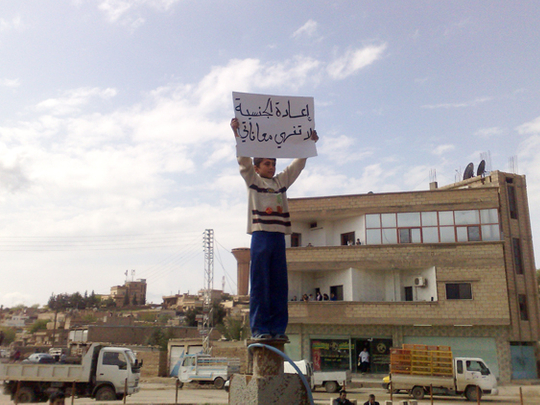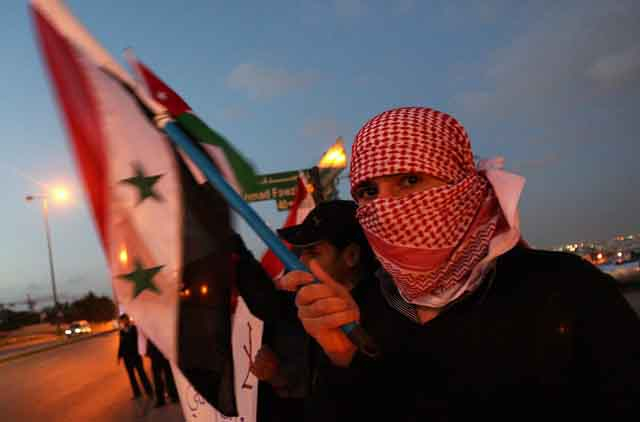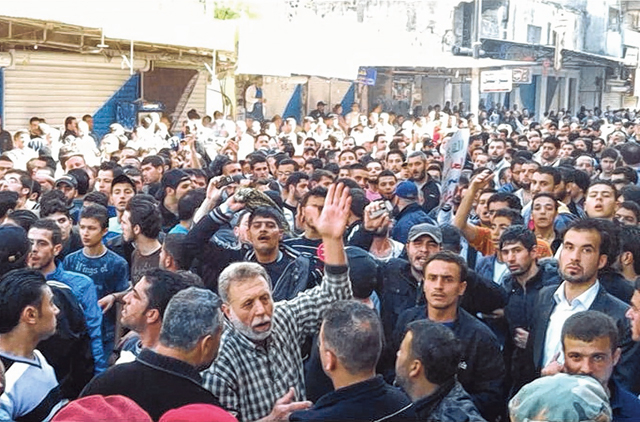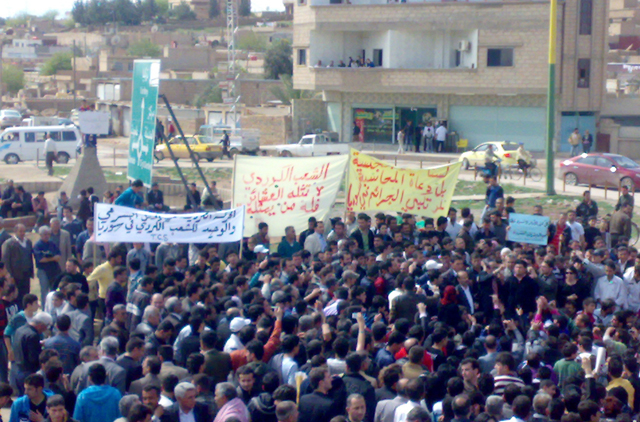
Beirut: A witness said that Syrian security forces have killed four protesters and wounded dozens in a coastal city.
The witness says the names of the dead were read out on mosque loudspeakers Sunday in the port city of Baniyas. He said most of the shooting occurred in the Ras Al Nabeh neighbourhood Sunday afternoon.
In focus: Unrest in the Middle East
Details were sketchy because telephone lines, internet access and electricity apparently were cut in the area. Army tanks and soldiers circled the city, preventing people from entering.
Protests erupted in Syria more than three weeks ago and have been growing steadily every week, with tens of thousands of people calling for sweeping reforms in President Bashar Assad's authoritarian regime. More than 170 people have been killed.
The government blames the violence on armed gangs rather than true reform-seekers and has vowed to crush further unrest.
Al Assad said on Sunday that the country is "moving ahead on the road of comprehensive reforms," the state-run news agency Sana said.
In recent weeks, Al Assad has answered the protesters with both force and limited concessions that have failed to appease an emboldened movement inspired by the Arab uprisings in Tunisia and Egypt.
Several human rights activists spoke to the AP on Sunday, citing Baniyas residents who fled the city.
Ammar Qurabi, head of Syria's National Organisation for Human Rights, said reports indicated that people had been killed and injured when security forces opened fire on a protest. Another activist, Mazen Darwish, said at least four tanks were deployed in the city, apparently to protect the oil refinery, which is the main point to export Syrian oil.
"There are demonstrations throughout the city and people are chanting against the regime," said Haitham Al Maleh, an 80-year-old lawyer and longtime rights activist who spent years as a political prisoner in Syria.
Syria's National Organisation for Human Rights said one person was wounded in Baniyas, but there were no details.
The accounts could not be independently confirmed. The government has placed severe restrictions on news coverage and many journalists - including from The Associated Press - have been ordered to leave the country.
A key demand of protesters is an end to a decades-old emergency law that gives the regime a free hand to arrest people without charge.
But Al Assad has stopped well short of the protesters" demands. Instead, he has promised to form committees to look into reform. Other gestures include granting citizenship to thousands of Kurds, the country's minority, and sacking his Cabinet.
Firing the government was largely symbolic, however, as the real power in Syria is concentrated around Assad and a tight coterie of family and advisers.
Also Sunday, the caretaker Syrian government eased foreigner's access to real estate in what appeared to be an attempt to attract foreign investment.
But those gestures have failed to appease a growing movement that is raising the ceiling on its demands for concrete reforms and free elections.
Warning
On Saturday, the Syrian Interior Ministry warned that the government will not tolerate any attempts to destabilise the country and disturb public peace under the guise of the right to protest.
The ministry in a statement said there was no justification for such acts since the leadership endorsed just demands of protesters. The statement came in the wake of protests in more than 15 towns and cities in Syria to mark a month of uprising in the country.
"Infiltrators and thugs, in addition to suspicious satellite channels" have been riding the wave of just demands of the protesters to destabilise the country. The ministry urged "citizens willing to practise their right of assembly to consider the changing facts into consideration and act accordingly".
The statement did not mention the steps the ministry was planning to take in case of further protests, but circles close to the government said imposing curfew is a looming possibility.
Protesters, however, rejected the statement and said that the thugs and infiltrators the government was blaming for the killing of protesters are the elements belonging to the government and there is no other explanation why thugs and infiltrators appear only during opposition protests.
"The parades of the government have never been attacked by thugs and the ministry did not explain why," a citizen from Daraa told Gulf News.
Ali Al Ahmad of Daraa said the people of the city and the surrounding villages and towns will not accept anything less than admitting responsibility for the victims and the bloodshed against the people in Daraa in the past month.
"Anything less than full responsibility and apology means that the situation in Daraa and the rest of the country will not be normal," he said.
Tribal culture
He said Daraa citizens have erected a tent for the victims of the massacre. "That means a lot in the tribal culture. People will not accept less than full revenge," he warned. Kurds in the northeast of Syria said they will support the uprising of their brethren in Daraa.
"The offer of citizenship by the government to more than 250,000, who enjoyed no citizenship since 1962, is their right and not a favour from the president. We don't want a citizenship without freedom. People of Kamishli and Hasaka will stand by their countrymen in Daraa," Hussain Darwish, leader of the Kurdish party said in a statement sent to Gulf News.
Meanwhile, the dissident leader of the largest of Syria's powerful tribes hit out at the authorities, telling AFP in Nicosia they had a final opportunity to avoid more bloodshed.
"There is still a last-ditch opportunity to avoid the bloodshed that the regime persists in causing," Al Bakkara chief Nawaf Al Bashir said.
With inputs from agencies














